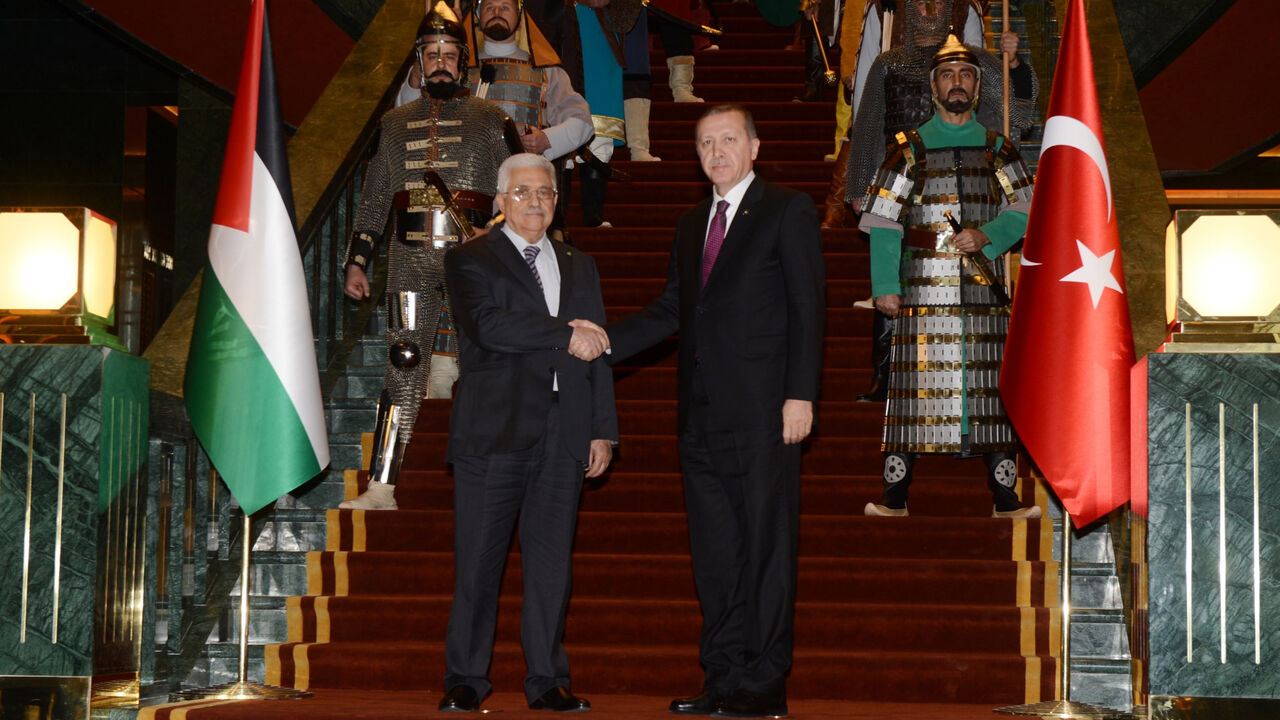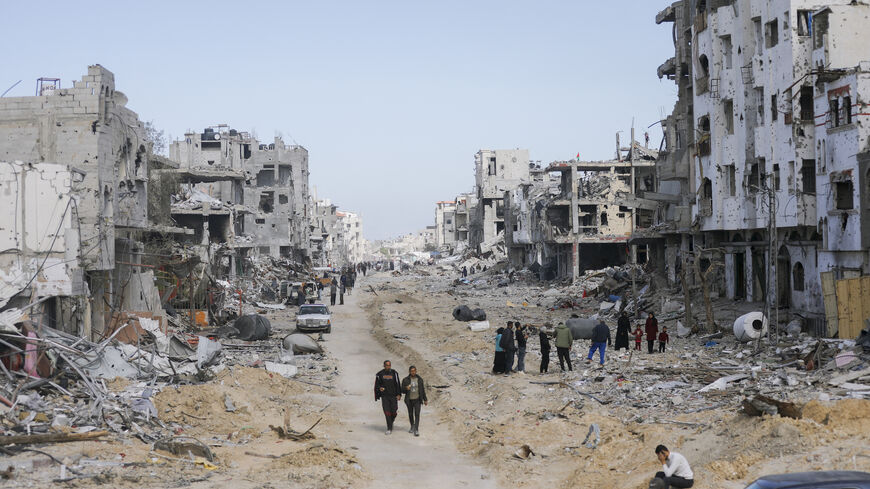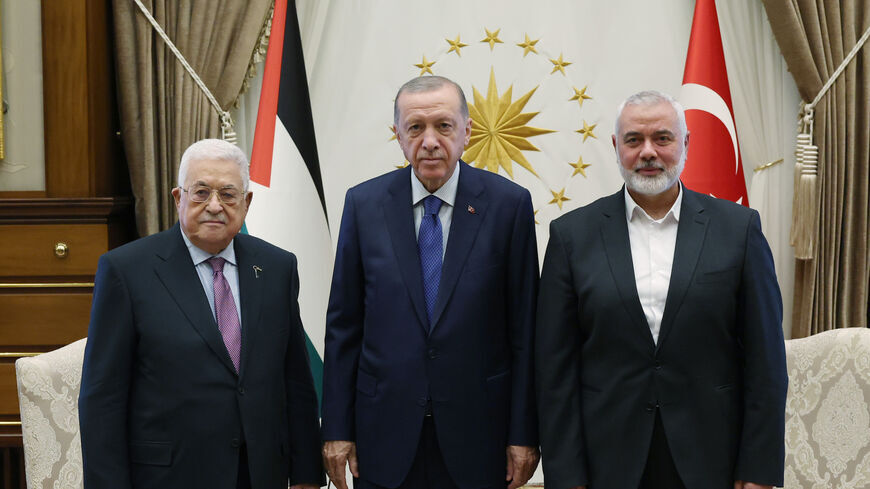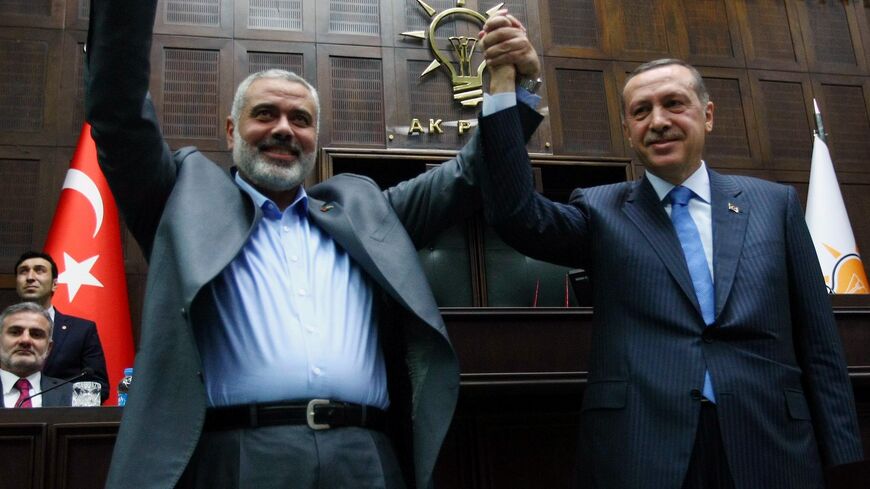Abbas in Turkey: Gaza aid, Hamas-Fatah reconciliation on agenda with Erdogan
Analysts believe the pair also discussed post-cease-fire scenarios in Gaza.

ANKARA — Turkish President Recep Tayyip Erdogan stressed the need for Palestinian unity as he hosted Palestinian President Mahmoud Abbas on Tuesday.
“Ensuring unity and solidarity among Palestinians would be the best response to Israeli oppression,” Erdogan said at a joint press conference with Abbas following their roughly hourlong one-on-one meeting in Ankara.
Abbas, who is on a three-day visit to Turkey at the invitation of Erdogan — the first of its kind since the start of the Hamas-Israel war — in turn, pledged to make “every effort” to achieve unity among Palestinians.
“We will unify Palestine and Palestinians together by fulfilling our international obligations under a political program,” he said, speaking through a translator.
Abbas also called for an international conference to draft a “road map” laying the groundwork for the recognition of Palestinian statehood. “Particularly, European countries must recognize Palestine,” he added.
Abbas’ visit comes amid US-led efforts to reform the Ramallah-based Palestinian Authority, PA, in a bid for what US Secretary of State Antony Blinken described in January as “effectively taking responsibility for Gaza” once the cease-fire is achieved. “So that Gaza and the West Bank can be reunited under Palestinian leadership,” Blinken said during his last trip to the region in January.
The PA government, headed by Prime Minister Mohammad Shtayyeh, resigned last week, reportedly to pave the way for a technocratic government acceptable to both Fatah and Hamas.
Erdogan pressed for a two-state solution, reiterating his country’s established position on the Israeli-Palestinian conflict. “The international community’s futile efforts to manage the outcome of the ongoing occupation instead of a two-state solution is a meaningless and useless approach,” he said. “All the relevant countries need to take responsibility to ensure the two-state solution.”
He added that Turkey was ready to assume a guarantor role on behalf of Palestine in a prospective peace process, as both leaders expressed their rejection of any displacement of Palestinians from their lands.
Analysts believe that the pair likely discussed post-ceasefire efforts in Gaza behind closed doors.
“One potential formula is the forming of a PA that will be inclusive of all Palestinian political movements,” said Selim Sezer, an assistant professor of international relations at Istanbul Gedik University, who closely follows the conflict. “If this is not possible, I believe Turkey will likely support the idea of a technocratic government,” he added.
According to Sezer, another issue the two addressed was the delivery of humanitarian aid to Gaza, where, according to the World Health Organization, “severe levels of malnutrition” caused the death of at least 10 children.
Turkish Foreign Minister Hakan Fidan suggested on Sunday that Turkey might be seeking to convince Egypt to dispatch aid to the Palestinian enclave through the Rafah crossing without receiving Israeli permission.
While Erdogan stopped short of defending any unilateral action on the aid, Fidan upped the ante on Tuesday. “There is an overwhelming expectation from us to act right now, even if it means doing so unilaterally,” Fidan said in an address at the Extraordinary Session of the Organization of Islamic Cooperation Council of Foreign Ministers in Jeddah.
Sezer recalled that the Egyptian side has been coordinating with Israel on entry and exit through the Rafah crossing under security agreements signed between the two countries in the past. “What is currently being talked about is a new arrangement that will allow aid trucks to enter Gaza only with the permission and approval of the Egyptian authorities, without the permission of the Israeli side,” he said.
Yet Egypt’s green light for such an effort seems like a tall prospect, according to Mehmet Rakipoglu, a nonresident fellow at the London-based Dimensions for Strategic Studies. “We are talking about Egypt and the Egyptian army that haven’t had any security problems with Israel after the two sides had normalized their relations in the past,” he told Al-Monitor. “It seems like there is no driving force to push Egypt to give a go-ahead for such a step."








